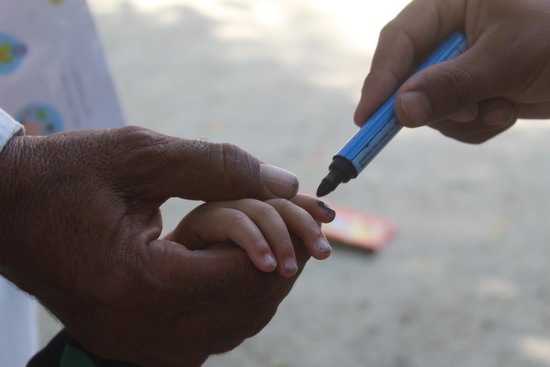
Kabul, 14 September 2020 – Polio vaccinations campaigns have resumed in Afghanistan 6 months into the COVID-19 pandemic that has left over 9.9 million children under 5 years of age exposed to poliovirus. Subnational Immunization Days (SNIDs) for polio eradication are planned from 14 to 18 September in 20 provinces of the east, west, south, central, northeast, and southeast regions, targeting around 6.1 million children under 5.
The emergence of the COVID-19 epidemic, which spread rapidly across the country, disrupted basic health services, including polio campaigns, which were halted from February until July 2020 to avoid the risk of COVID-19 transmission to children, caregivers and vaccinators themselves. As of today, wild poliovirus cases have increased to 46 in 2020, 32 of which are from the southern region, mainly from areas with access challenges, while others have been reported in various parts of the country that were previously polio-free.
“We cannot allow polio to continue ravaging the lives of our children,” said Dr Ahmad Jawad Usmani, the Minister of Public Health in Afghanistan. “The government has allowed campaigns to resume amidst COVID-19, while taking precautions to ensure all our children are protected against polio. I’m calling on all parents and caregivers to welcome frontline workers to vaccinate their children against polio. The future of Afghanistan depends on how well we protect our children against vaccine-preventable diseases,” remarked Dr Usmani.
Vaccinating every child through multiple doses of the polio vaccine is the only way to stop the poliovirus currently in circulation across the country. To mitigate any risks of COVID-19 transmission during the polio vaccination campaigns, the programme is providing personal protective equipment to polio frontline workers and following strict protocols so that the campaigns can resume safely.
“The polio health workers are already extensively trained in infection prevention and control measures as the programme has been supporting the ongoing COVID-19 response since the beginning of the emergency,” said Dr Richard Peeperkorn, WHO Representative to Afghanistan. “The programme is well prepared to use that experience to safely and quickly resume polio vaccinations. As COVID-19 continues to persist it is important that vaccinations and other essential health services are resumed and strengthened so that one health crisis does not lead to another,” added Dr Peeperkorn.
While every effort is being made to vaccinate all children against polio, the programme is concerned that close to 2 million children across the country could be missed out due to a lack of door-to-door vaccinations in areas which the polio programme is unable to access and health facilities being far away from communities.
“It is critical that Afghan children are protected against preventable diseases like polio,” said Dr Aboubacar Kampo, UNICEF Country Representative to Afghanistan. “We must use all possible strategies and involve all local partners to reach every child and get rid of this contagious disease,” added Dr Kampo.”
The Government, WHO, UNICEF and donors are calling for combined effort during this campaign to ensure safe access to all children for polio vaccination.


